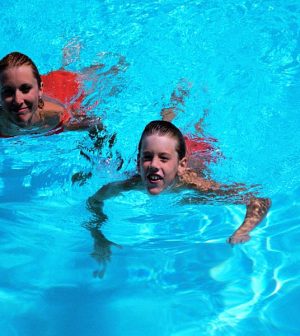- Could Your Grocery Store Meat Be Causing Recurring UTIs?
- Are You Making This Expensive Thermostat Error This Winter?
- Recognizing the Signs of Hypothyroidism
- 10 Strategies to Overcome Insomnia
- Could Artificial Sweeteners Be Aging the Brain Faster?
- Techniques for Soothing Your Nervous System
- Does the Water in Your House Smell Funny? Here’s Why
- Can a Daily Dose of Apple Cider Vinegar Actually Aid Weight Loss?
- 6 Health Beverages That Can Actually Spike Your Blood Sugar
- Treatment Options for Social Anxiety Disorder
Many Parents Underestimate Drowning Risks

Pretty soon kids will be clamoring to dive into pools all across America, but many may not have the swimming skills they need to safely splash around.
And many American parents think their children are safe from drowning in pools, a new survey reveals.
While few parents would allow their child to swim unsupervised in a lake (16 percent) or ocean (13 percent), 37 percent would allow their child to use a backyard, hotel or neighborhood pool without adult supervision, according to the C.S. Mott Children’s Hospital National Poll on Children’s Health at the University of Michigan.
“Many families enjoy spending time around a pool or lake in the summer, but parents should be cautious of keeping children safe around the water,” poll co-director and pediatrician Dr. Gary Freed said in a university news release.
“Familiar places such as a backyard pool may provide a false sense of security, but we know that drowning can occur anywhere, often instantly and silently. We strongly advise parents to closely supervise kids at all times, even if they think their child is a good swimmer,” he said.
Drowning is the second-leading cause of injury-related death in American children aged 1 to 15. Each year, about 1,000 youngsters die from unintentional drowning. About five times as many require emergency department treatment for non-fatal water-related injuries, according to the U.S. Centers for Disease Control and Prevention.
The survey included more than 1,500 parents of children aged 6 to 18.
The survey also found that race and ethnicity influenced whether a child took swimming lessons.
Fifty-percent of white parents said their child had taken swimming lessons, compared with 39 percent of Hispanic parents and 37 percent of black parents. National data show that black children are far more likely to drown in a pool than white children, the researchers said.
The most common reasons cited by parents for their children not taking swim lessons were: their child learned to swim without them; lessons cost too much; the time or location of lessons was not convenient; lessons were not a priority; and classes were not available in their area.
Among parents who said their child can swim independently, 45 percent would permit the child to be in a pool unsupervised, compared with 14 percent of parents whose child cannot swim independently.
“Almost all of the parents we polled believe it is important for children to have basic swimming skills but surprisingly, one in seven would allow a child who is unable to swim independently to be in the water unsupervised,” Freed said.
“Drownings can, and do, happen in private and hotel pools as well as in lakes and the ocean — even at shallow depths. Swimming lessons and proper supervision are critical to making sure kids are safe around the water,” he said.
More information
The American Academy of Pediatrics has more on drowning prevention.
Source: HealthDay
Copyright © 2026 HealthDay. All rights reserved.










